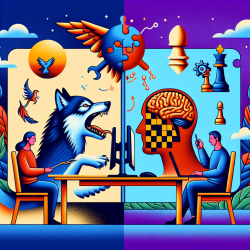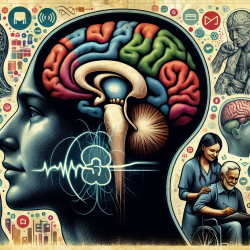As practitioners in the field of therapy, our mission is to continuously improve our skills and methodologies to better serve our clients. One intriguing area of study that offers valuable insights is the intellectual difference between man and animals, as explored in the research article "Instinct and Reason; or, the Intellectual Difference between Man and Animals" by James Quilter Rumball. This historical research provides a foundation for understanding how instinct and reason interplay in human behavior, offering lessons that can be applied to modern therapeutic practices.
The Core Insights from the Research
The research delves into the distinctions between instinctual behaviors observed in animals and the reasoning capabilities of humans. It highlights that while animals rely heavily on instinctual responses for survival, humans possess the unique ability to reason and make decisions based on complex thought processes. This duality of instinct and reason is crucial for therapists to understand as it impacts how individuals process experiences and respond to challenges.
Key Takeaways for Practitioners:
- Understanding Instinctual Responses: Recognizing instinctual reactions in clients can help therapists identify underlying issues that may not be immediately apparent through verbal communication alone.
- Balancing Instinct and Reason: Encouraging clients to harness their reasoning abilities while acknowledging their instinctual responses can lead to more effective coping strategies.
- Enhancing Empathy: By understanding the natural instincts shared across species, therapists can foster a deeper empathy towards clients' innate reactions.
Applying Research Insights to Modern Therapy
The insights from this research can be directly applied to enhance therapeutic practices. Here are some strategies practitioners can implement:
- Incorporate Animal-Assisted Therapy: By integrating animals into therapy sessions, practitioners can observe clients' interactions with animals to gain insights into their instinctual behaviors.
- Cognitive Behavioral Techniques: Use cognitive behavioral techniques to help clients distinguish between instinctual reactions and reasoned responses, promoting healthier decision-making processes.
- Mindfulness Practices: Encourage mindfulness practices that help clients become aware of their instinctual responses, allowing them to pause and engage their reasoning abilities before reacting.
The Call for Further Research
The exploration of instinct and reason is an ongoing journey. As practitioners, we should be encouraged to delve deeper into this field of study. Conducting further research can unveil new methodologies that bridge the gap between instinctual behavior and rational thought processes, ultimately enhancing therapeutic outcomes.
Instinct and Reason; or, the Intellectual Difference between Man and Animals
This research serves as a reminder that understanding the balance between instinct and reason is not only essential for personal growth but also for professional development as therapists. By embracing these concepts, we can unlock new potentials within ourselves and our clients.










